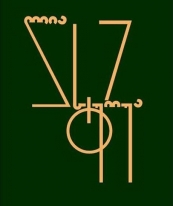SELECTED POEMS
EXTRACT
Translated into English by Dalila Gogia and Tim Kercher
SOMETIMES YOU GET USED TO A PERSON
Sometimes you get used to a person
Like you get used to a thing, or to bread,
Or to each new day.
Sometimes, you find a person and run away
As though you fear he’s becoming
Just like others. When you met me,
the guilt was eating me up,
an odd sense of it,
but you saw the books inside my head,
opened one of them
and found a murdered poet.
And then, again and again,
You expressed your sympathies,
lighting me up with a dazzling day
so that my head may charm you with hair
or a pose that is best in the sun,
yet x-ray film never lies.
What you wanted was to get at the truth,
To immediately help yourself escape.
But you didn’t manage to leave, to get away...
CEZANNE
Who will paint the thrill derived from peaches?
Mr. Cezanne, who
graduated from a fine art academy,
who sleeps in the street
with his shoes under his head.
He is hungry, while at a Sotheby Auction
his peaches are being eaten.
Those who paint flesh don’t like him
nor do the art teachers:
he is rectangle with an aching side,
he paints peaches, not a fear walking
on the their bruises.
Does he have time for mystics
since he understands the truth of form?
And as soon as God sees him
Cezanne will immediately paint the thrill of peaches
to win Him over from
a painting of pink flesh...
HUMAN VOICE
I call the inquiry office
To hear a human voice.
I do not imitate anyone, not Cocteau -
everyone has his own silence
accompanied with more or less a degree of bitterness.
First verbosity, then eloquence,
lectures given on the lectern barricades
with drops of blood,
citations from poems,
then her loneliness touches existence with her
fingers all in rings.
I catch a weed,
she is phoning the man who abandoned her,
but he is out somewhere, drinking coffee,
and talking of a violet as if of a woman,
or vise versa - playing with aesthetics!
I m calling the inquiry office that gives away
phone numbers of only the living.
WILL ANY MAN BELIEVE
Will any man believe
I am pregnant with the sea,
Or that such tremendous volume is possible
to fertilize in an ordinary bed?
Such panic
when I attempt to give birth to a couple of waves!
Who will be willing to murder them?
What spot will they drive a nail into?
I think about it
under the command of a tear,
salt eating up my bitten finger nails,
what bitterness!
I will force myself to put on airs
after I become lighter by one sea,
I, who walk on the bottom
out of depression
with algae-hair
and with such an active tongue
it will strangle if it wraps around neck.
Nobody has ever seen my aggression!
But what about children, or that man
who spared the last fire for me,
for whom I m grateful and in return give the sea!
I made him realize this!
Just as the aquarium with just a few glasses of water thinks about the ocean,
I got him to see
the huge and predatory spaces
leaving fear of myself
along with the possibility
of giving birth to sea waves
even from my heart
directly, on the surgery table.
In case of using the information, please, indicate the source.
